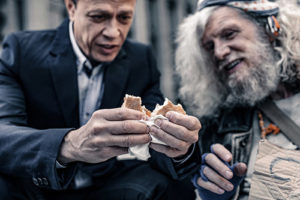What is Freemasonry?
The world’s oldest fraternity. An organization that makes good men better. A place for philosophy and esoteric studies. A charitable organization. Freemasonry is all of these, and more.
From a historical perspective, Modern Freemasonry rose from the Masonic trade guilds of the early 17th century in England and various parts of Europe. From there, these operative guilds started accepting members who did not work in the Masonic trade but lent their support and patronage to the fraternity. As more of these “speculative” members were accepted into the fraternity, the symbolism of the tools used by operative masons were given deeper meaning and became the blueprint for the current Masonic organization as it is known today.
A place for introspection and education
 The symbols used in Freemasonry are meant to teach a specific set of principles that help men navigate through today’s social and moral challenges, not from a religious standpoint, but more from a humanistic and philosophical point of view. It’s meant to teach members that “every human being has a claim upon our kind offices” and that all are created equal. This philosophical view has been the fraternity’s guiding principles since its inception.
The symbols used in Freemasonry are meant to teach a specific set of principles that help men navigate through today’s social and moral challenges, not from a religious standpoint, but more from a humanistic and philosophical point of view. It’s meant to teach members that “every human being has a claim upon our kind offices” and that all are created equal. This philosophical view has been the fraternity’s guiding principles since its inception.
A haven for civility
 Civil discourse is the foundation of a free and democratic society. Unfortunately, finding a place to have a civil conversation about any topic is harder to find, especially in today’s socio-political climate. While divisive topics such as finances, religion and politics are prohibited in open lodge, Masons know that respect for different opinions on these matters is the hallmark of a vibrant society and that the freedom of expression should always be protected.
Civil discourse is the foundation of a free and democratic society. Unfortunately, finding a place to have a civil conversation about any topic is harder to find, especially in today’s socio-political climate. While divisive topics such as finances, religion and politics are prohibited in open lodge, Masons know that respect for different opinions on these matters is the hallmark of a vibrant society and that the freedom of expression should always be protected.
Charities that help humanity
 Masons and their related Masonic organizations such as the York Rite, the Scottish Rite the Shrine and many others have been very active in supporting various charitable organizations. It is estimated that the family of Freemasonry donate at least a million dollars a day to support various causes such as the Shriners Hospitals for Children and the Masonic Medical Research Institute, to name a few.
Masons and their related Masonic organizations such as the York Rite, the Scottish Rite the Shrine and many others have been very active in supporting various charitable organizations. It is estimated that the family of Freemasonry donate at least a million dollars a day to support various causes such as the Shriners Hospitals for Children and the Masonic Medical Research Institute, to name a few.

